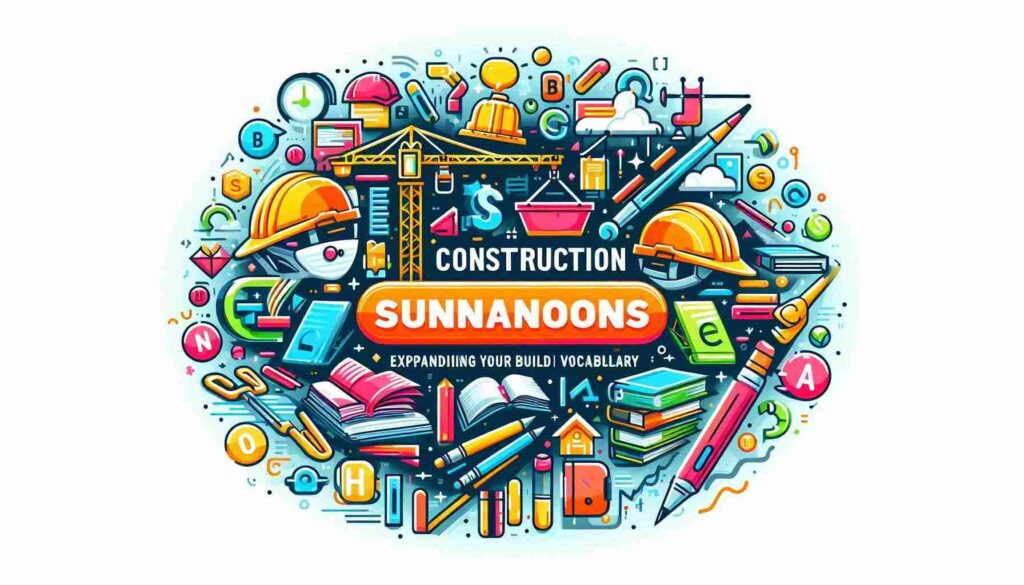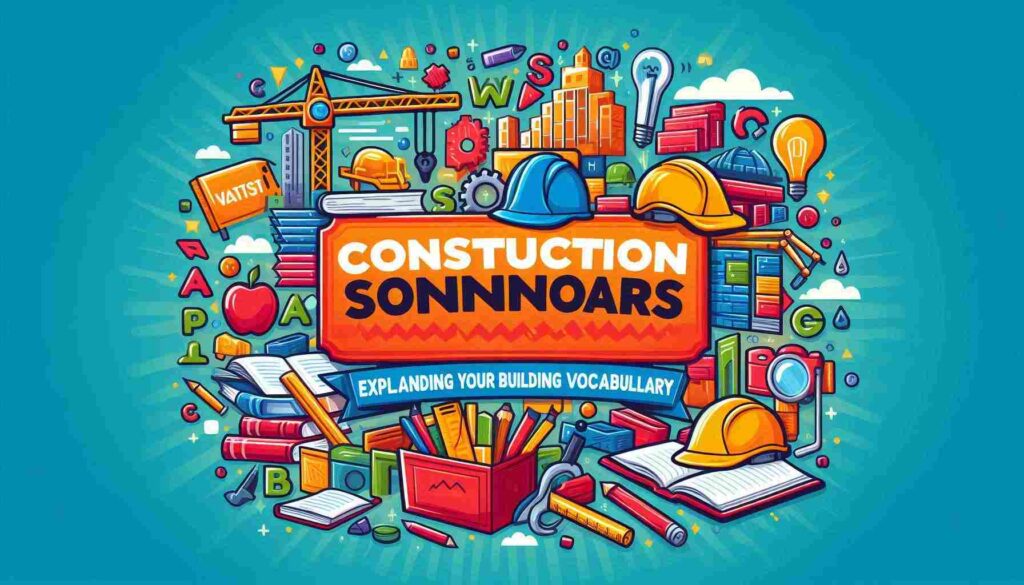Ever found yourself stuck in a rut, using the same old words to describe construction projects? You’re not alone. Construction synonyms are like the secret sauce of the building industry – they can spice up your vocabulary and make your conversations more engaging. Whether you’re a seasoned pro or just starting out, expanding your building lexicon can be a game-changer.
As the famous architect Frank Gehry once said, “Architecture should speak of its time and place, but yearn for timelessness.” The same can be said for the language we use to describe construction. It should be current and relevant, yet have a lasting impact.
In this blog post, we’ll explore a treasure trove of construction synonyms that’ll help you communicate more effectively and add some flair to your building banter. Let’s dive in and start building your vocabulary, brick by word!
Key Takeaways
- Construction synonyms enhance communication in the building industry
- Expanding your vocabulary can make you sound more professional and knowledgeable
- Using varied terms can help avoid repetition in reports and presentations
- A rich vocabulary can improve understanding between different construction roles
- Learning new synonyms can be fun and boost your confidence in the field

The Foundation of Construction Vocabulary
Before we start piling on the synonyms, let’s lay the groundwork. Construction vocabulary is the collection of terms and phrases used in the building industry to describe processes, materials, and concepts. It’s the linguistic toolkit that helps professionals communicate effectively on job sites, in boardrooms, and with clients.
Having a solid grasp of construction synonyms isn’t just about sounding smart – it’s about being precise and avoiding misunderstandings. When you can describe a project or problem in multiple ways, you’re more likely to get your point across clearly. Plus, it makes those long site meetings a bit more interesting!
Building Blocks: Essential Construction Terms and Their Synonyms
Let’s start with some of the most common construction terms and explore their synonyms. These are the words you’ll use day in and day out, so having alternatives at your fingertips can be incredibly useful.
Build
- Construct
- Erect
- Assemble
- Fabricate
- Forge
Example: “We’re not just gonna build this structure; we’re gonna forge a masterpiece that’ll stand the test of time!”
Demolish
- Raze
- Tear down
- Dismantle
- Deconstruct
- Level
Example: “Before we can erect the new office complex, we need to raze the old warehouse. It’s been standing there since the 70s!”
Renovate
- Refurbish
- Remodel
- Revamp
- Overhaul
- Modernize
Example: “The client doesn’t just want to renovate the kitchen; they want to completely overhaul it. We’re talking top-to-bottom transformation!”

Structural Savvy: Synonyms for Building Components
Now that we’ve covered some basic verbs, let’s move on to the nouns – the building components themselves. Having a variety of ways to describe these elements can make your reports and presentations more engaging.
Foundation
- Base
- Footing
- Substructure
- Groundwork
- Underpinning
Example: “The footing of this skyscraper needs to be rock-solid. We’re not taking any chances with the substructure.”
Wall
- Partition
- Barrier
- Divider
- Enclosure
- Bulwark
Example: “We’re not just putting up walls here; we’re creating partitions that’ll define the space and flow of the entire office.”
Roof
- Covering
- Canopy
- Top
- Crown
- Shell
Example: “The architect wants a canopy that’ll make a statement. This isn’t just a roof; it’s the crown of the building!”
Material Matters: Synonyms for Construction Supplies
Every construction project is only as good as the materials used. Let’s explore some synonyms for common building supplies to help you describe your materials with precision and flair.
Concrete
- Cement mixture
- Mortar
- Grout
- Aggregate blend
- Cast stone
Example: “We’re not just pouring concrete here; we’re laying down a cement mixture that’ll be the backbone of this structure for decades to come.”
Wood
- Timber
- Lumber
- Planks
- Boards
- Beams
Example: “The client wants a rustic look, so we’ll be using reclaimed timber for the main support beams. It’s not just wood; it’s a piece of history!”
Steel
- Metal
- Alloy
- Ironwork
- Girders
- Reinforcement
Example: “The framework of this bridge isn’t just steel; it’s a complex alloy designed to withstand extreme weather conditions.”

Tools of the Trade: Synonyms for Construction Equipment
No construction project is complete without the right tools. Let’s beef up your vocabulary when it comes to describing the equipment you use every day.
Excavator
- Digger
- Earth mover
- Backhoe
- Power shovel
- Trackhoe
Example: “We’re bringing in the big guns for this foundation – a massive earth mover that’ll make short work of this rocky terrain.”
Crane
- Hoist
- Lift
- Derrick
- Jib
- Gantry
Example: “We’re not just using a crane; we’re employing a state-of-the-art gantry system to maneuver those massive steel beams into place.”
Bulldozer
- Dozer
- Crawler
- Earthmover
- Caterpillar
- Pusher
Example: “That old parking lot won’t know what hit it when our crawler starts pushing through. It’s not just a bulldozer; it’s a land-reforming beast!”
As we continue to explore the vast world of construction synonyms, remember that language is a powerful tool in your construction toolkit. The right words can paint a vivid picture, convey complex ideas, and even inspire your team. In the next section, we’ll delve into more advanced terminology and explore how to use these synonyms effectively in different scenarios…
Now that we’ve covered the basics, let’s dive deeper into the world of construction synonyms. It’s time to elevate your vocabulary game and really impress your colleagues and clients!
Advanced Terminology: Taking Your Construction Lingo to the Next Level
Ready to sound like a true construction virtuoso? Let’s explore some more sophisticated terms that’ll make you stand out on the job site.
Architectural Features
- Fenestration (instead of “windows and doors”)
- Soffit (instead of “underside of roof overhang”)
- Corbel (instead of “projecting bracket”)
- Pilaster (instead of “decorative column”)
- Quoin (instead of “exterior corner”)
Example: “The architect’s design calls for elaborate fenestration to maximize natural light. We’re not just putting in windows; we’re creating a visual symphony!”
Construction Techniques
- Tilt-up construction (instead of “precast concrete walls”)
- Post-tensioning (instead of “reinforcing concrete”)
- Curtain walling (instead of “non-structural outer walls”)
- Shotcrete application (instead of “sprayed concrete”)
- Piling (instead of “deep foundation work”)
Example: “We’re using tilt-up construction for this warehouse. It’s not just faster; it’s a game-changer for efficiency and strength!”
Putting It All Together: Real-World Applications
Now that you’ve got a toolbox full of construction synonyms, let’s see how to use them in real-world scenarios. These examples will help you communicate more effectively in various construction-related situations.
Client Presentations
Instead of saying, “We’re going to build a big building,” try this: “Our team is prepared to erect a state-of-the-art structure that will not only meet your functional requirements but also serve as an architectural landmark in the cityscape.”
Team Briefings
Rather than, “We need to fix the roof,” opt for: “Our next task is to overhaul the roofing system, focusing on reinforcing the underlying structure and implementing a more durable waterproofing solution.”
Project Reports
Instead of, “The walls are up,” consider: “The vertical elements have been successfully installed, including load-bearing partitions and curtain walling, creating a robust envelope for the structure.”
The Power of Precision: Why Synonyms Matter in Construction
Using a rich vocabulary in construction isn’t just about sounding smart – it’s about precision and clarity. When you can describe a process or component in multiple ways, you’re more likely to find the perfect term that captures exactly what you mean.
Moreover, a diverse vocabulary can help bridge gaps between different roles in the construction industry. From architects to engineers, from project managers to laborers, each group might have their preferred terms. By expanding your lexicon, you’re better equipped to communicate effectively with everyone involved in a project.
Remember, though, that the goal is clear communication, not confusion. Use these synonyms thoughtfully, and always be ready to explain or clarify if needed. After all, construction is a collaborative effort, and good communication is the foundation of any successful project.
As we wrap up this linguistic journey through the world of construction, remember that language, like buildings, is always evolving. Keep learning, keep listening, and don’t be afraid to incorporate new terms into your vocabulary. Who knows? You might just become the go-to wordsmith on your next big project!
So, the next time you’re on site or in a meeting, flex those verbal muscles. Use “erect” instead of “build,” talk about “fenestration” instead of just windows, or describe how you’re going to “overhaul” a space rather than simply renovate it. Your colleagues and clients will take notice, and you’ll be constructing more than just buildings – you’ll be building a reputation as a true construction connoisseur.
Frequently Asked Questions
1. Why is it important to use synonyms in construction communication?
Using synonyms in construction communication is crucial for several reasons. It helps avoid repetition, making your speech and writing more engaging. It also allows for greater precision in describing complex processes or components. Additionally, a rich vocabulary can improve understanding between different roles in the construction industry, from architects to laborers, as each group might have their preferred terms.
2. How can I remember all these new construction terms?
Remembering new terms takes practice. Try using a new word in conversation or writing each day. Create flashcards or use a vocabulary app. Reading industry publications and attending conferences can also help expose you to new terms in context. Don’t be afraid to ask colleagues about unfamiliar terms – it’s a great way to learn and network!
3. Are there regional differences in construction vocabulary?
Yes, construction vocabulary can vary by region. For example, what’s called a “hard hat” in the US might be referred to as a “safety helmet” in the UK. Similarly, “rebar” in the US is often called “reinforcing steel” in other English-speaking countries. It’s always a good idea to familiarize yourself with local terms when working in different regions.
4. How can using advanced construction terminology benefit my career?
Using advanced construction terminology can significantly benefit your career. It demonstrates expertise and professionalism, which can impress clients and superiors. It also enhances your ability to communicate complex ideas clearly, which is valuable in project management and leadership roles. Moreover, a rich vocabulary can help you understand and contribute to high-level discussions, potentially opening up new career opportunities.
5. Is it okay to use these synonyms with clients who might not be familiar with construction jargon?
While it’s great to have a rich vocabulary, it’s equally important to gauge your audience. With clients unfamiliar with construction jargon, it’s best to use simpler terms or to explain any technical terms you use. The goal is clear communication, not to impress with vocabulary. However, gradually introducing more advanced terms (with explanations) can help educate your clients and build their trust in your expertise.
6. How often does construction vocabulary change or update?
Construction vocabulary evolves continuously, much like the industry itself. New terms are introduced with technological advancements, changing building codes, and innovative construction methods. While core terminology remains relatively stable, it’s a good idea to stay updated by regularly reading industry publications, attending conferences, and participating in professional development courses.
7. Are there any online resources for learning more construction synonyms?
Yes, there are several online resources for expanding your construction vocabulary. Industry-specific dictionaries, like the Construction Dictionary by the National Association of Home Builders, are excellent. Websites like ConstructionDive and Engineering News-Record often use advanced terminology in their articles. There are also construction-specific vocabulary apps available for smartphones.
8. How can I incorporate new construction terms into my daily work without sounding forced?
The key is to start slowly and naturally. Begin by using one or two new terms in your daily conversations or reports. As you become more comfortable, gradually increase your use of advanced terminology. Always be prepared to explain terms if asked, and use them in context where their meaning is clear. Remember, the goal is effective communication, not just using big words.
9. Are there any construction terms that are commonly misused?
Yes, some construction terms are often misused. For example, “cement” is often used interchangeably with “concrete,” but cement is actually just one component of concrete. “Hardwood” is sometimes used to describe any wood flooring, but it specifically refers to wood from deciduous trees. “Trim” and “molding” are often confused, but trim is a broader category that includes molding. Being aware of these common mistakes can help you use terms more accurately.
10. How can understanding construction synonyms improve project efficiency?
Understanding a wide range of construction synonyms can significantly improve project efficiency. It allows for clearer, more precise communication between team members, reducing misunderstandings and errors. It can speed up the process of writing and reading reports, as you can choose the most accurate term for each situation. Moreover, it can facilitate better communication with clients, suppliers, and regulatory bodies, potentially smoothing out processes and avoiding delays. In essence, a rich vocabulary acts as a lubricant for the entire construction process.






